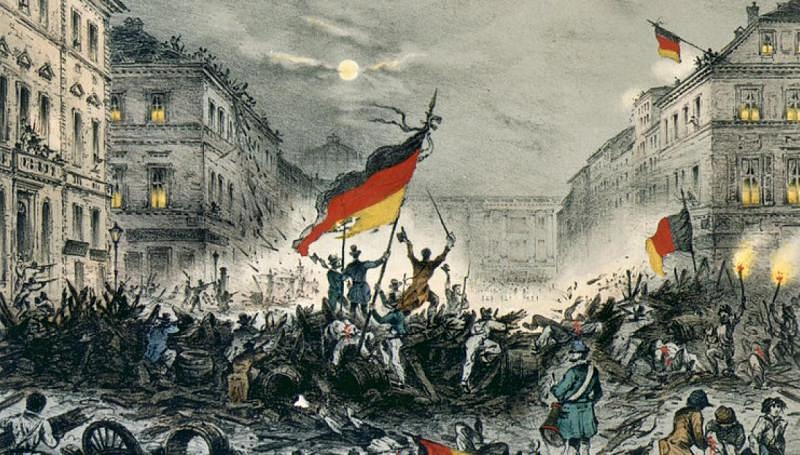
|
Home DH-debate |
When Karl Marx died in 1883, he was buried in Highgate Cemetery in London. Only about a dozen people attended the ceremony, including the closest family. No one could imagine that his ideas should have worldwide and dramatic consequences. Today, 135 years after his death, we can truly say that the huge support to Marxism has had an impact on the modern world history, surpassed only by the spread of Christianity and the rise of islam.
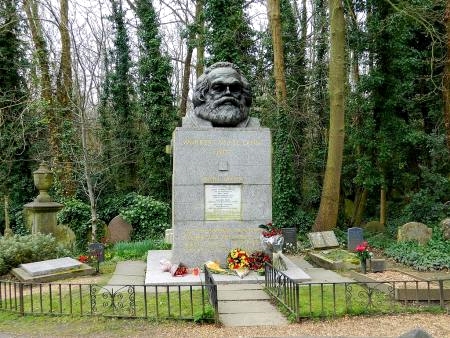
Marx' grave in East Highgate Cemetery in London. Photo Paasikivi Wikipedia.
Karl Marx was a German economist and philosopher, who made a radical proposal for solving the poverty problem.
Marxism is a collection of theories based on Karl Marx's analysis of capitalism. Throughout his life, he released a stream of political publications, among them "The Communist Manifesto", "The German Ideology", "Critique of the Gotha Programme" and "The Poverty of Philosophy". He formulated especially his criticism of society in his main work, "Capital", which he wrote on until his death, and which was completed by his lifelong friend, Friedrich Engels.
Karl Marx was born on May 5. 1818. We can thus celebrate his 200 years birthday in a very near future.
He came into the world as one of nine children in a Jewish family in the city of Trier on the river Rhine in what was then Prussia, quite near the modern German border to Luxemburg. Both his father and mother came from reputable Jewish families, which counted several generations of respected rabbis. However, his father, whose name was Heinrich Marx, chose to convert to Protestantism, hoping for a legal career in the kingdom of Prussia.
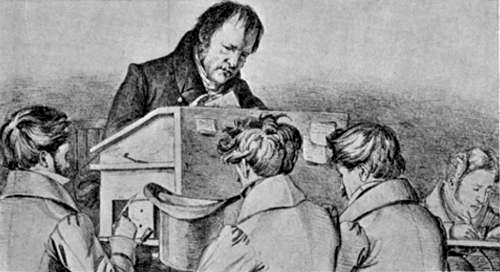
Hegel lectures in Berlin. Drawing from "Die Wahrheit ist selbst geschichtliche Bestimmtheit - Junghegelianer und die 68er".
In October 1835, Marx began studying at the University of Bonn. He was not a very diligent student, but he took eagerly part in the city's lively student life. During his two semesters there, he was imprisoned for drunkenness and street disorder, he incurred debt and participated in a duel. By the end of 1836, Marx's father insisted on enrolling him in the more serious Berlin University in the hope that the son would behave better there.
In Berlin, Marx began studying law and philosophy and was introduced to G.W.F. Hegel's idealistic history-philosophy. Hegel had been a professor in Berlin until his death in 1831. Originally, Marx was not particularly interested in Hegel's philosophy, but in Berlin, he soon became engaged in a radical political student group, who called themselves "die Junghegelianen", the young Hegelians. The group criticized the political and religious order of society and counted among others the philosophers Ludwig Feuerbach and Bruno Bauer.
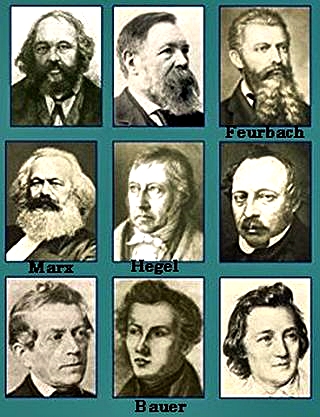
The Junghegelians with Georg Wilhelm Friedrich Hegel in the middle, Karl Marx left, Ludwig Feuerbach top right and Bruno Bauer lower center. Unfortunately. the author can not identify the others. From the front page of "Die Junghegelianer Portait einer progressiven intellektuellen Gruppe" by Josef Ratner and Gerhard Danzer.
Marx was an average student, who did not give his studies much attention. He spent much of the money, that his father sent him for payment for lessons, in Berlin's coffee houses, bars and taverns, where he discussed Hegel's philosophy with other students. He found it hard to complete his education. However, in April 1841 he managed to obtain a doctorate in philosophy by sending his dissertation to the University of Jena, a city in Thuringia. It treated the difference between the ancient Greek philosophers Democritus and Epicurus.
In July 1841 Karl Marx and Bruno Bauer traveled from Berlin to Bonn on a visit. There they created a scandal by getting drunk, laughing in the church and riding through the streets on donkeys - as Jesus Palm Sunday rode into Jerusalem on a donkey.
The authorities of the Kingdom of Prussia did not look with gentle eyes on the young Hegelians, and a university career soon proved impossible. In the period 1841-48 Marx worked instead as a freelance or short-time employed journalist for various opposition newspapers and magazines. In 1842 he became a journalist at the Left-wing newspaper Rheinische Zeitung.
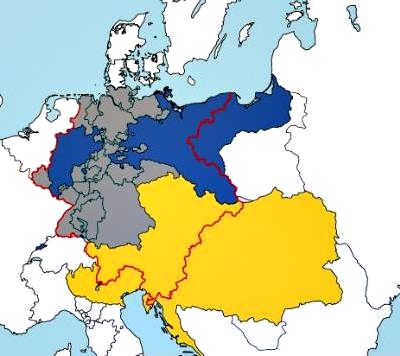
The blue area represents the Kingdom of Prussia in 1848. From 52 Pickup Wikipedia.
Only one year later, in April 1843, the government ordered the newspaper to close and he stood again without work. It did not prevent him from marrying Jenny von Westphalen three months later. Together the young couple moved to the city of the cities, Paris, where he became co-editor of a new left-wing newspaper called Deutsch-Franzoesische Jahrbucher. In Paris, he met Friedrich Engels, who should become his lifelong friend and political ally.
However, Jahrbucher soon had to close because of editorial disagreement, and he came instead to the newspaper Vorwaerts, also in Paris. But this newspaper was closed by the French authorities, and Karl Marx was expelled from France.
Then, in 1845, the Marx family moved to Brussels, where he became editor of the newspaper Deutsche Brusseler Zeitung.
In 1848 he was appointed an editor of the new political opposition newspaper Neue Rheinische Zeitung in Cologne.
During all these changes, he released a stream of political writings, often together with Engels, including the Communist Manifesto, published in February 1848 a few months before the massive 1848 revolutions broke out over the whole of Europe.
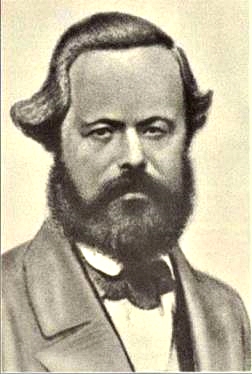
Drawing of Karl Marx as a young man. It may not be completely contemporary. From slideplayer.com.
However, the Government of Prussia took more firmly on the revolutionary street fighters than Frederik 7. did in Denmark. After extensive fighting, the revolution was suppressed. Thousands were imprisoned or exiled; many emigrated to America. The authorities closed the Neue Rheinische Zeitung May 19. in 1849 because of the newspaper's support for the revolutionaries demands for constitutional reforms.
Belgium expelled Karl Marx and the Prussian government refused to receive him despite his citizenship. Forced by the circumstances, he had to move to England with his family in 1849, where he then lived the rest of his life in very difficult circumstances. He was mostly supported by Engels. In London, he continued his analysis of political economy. Much of the work he did in the reading room of the British Museum.
Already in 1836, before he left Bonn to study in Berlin, he was secretly engaged to Jenny von Westphalen, who was a coveted young woman from a very reputable family in Trier. This, together with the young Karl's increased interest in revolutionary politics, raised the father's concern. In a series of letters, he expressed his worries for, what he saw as Karl's inner "demon" and urged him to take his marriage obligations more seriously, especially as his future wife came from a higher class.

|
Iconic drawing of the 1848 riots in Berlin. In the middle and bottom, the monarchists' flag with horizontal stripes. They wanted a united Germany led by a monarch. To the right and above is the Republican revolutionaries' flag with vertical stripes. They wanted a republic after French example, and therefore their flag was an imitation of the French tricolore with vertical stripes. Wikimedia.commons.
Karl Marx and Jenny von Westphalen knew each other already from primary school or high school in Trier. She was 22 years old and probably in many ways an experienced woman when she was infatuated by the bold and daring young man of 18 years, and they became secretly engaged. But only in 1843, seven years later, they married. They stuck together the rest of their lives and had seven children together, of which only three daughters survived childhood.
Karl Marx was a charismatic and dominant personality; probably not unlike today's Amdi Petersen from the Danish Tvind Corporation.
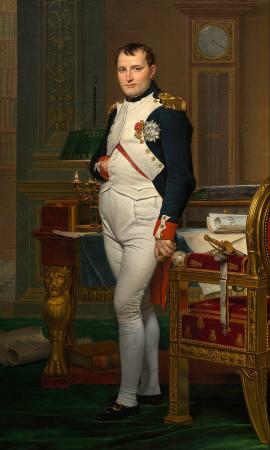
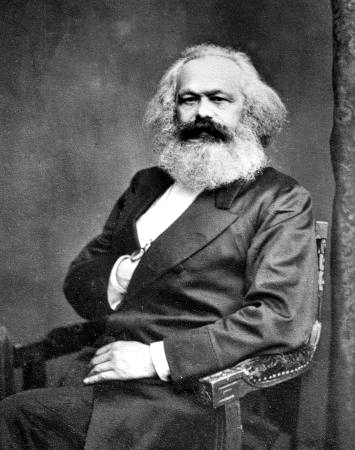
|
Left: Napoleon Bonaparte as first consul in 1799 with his right hand tucked into the waistcoat, painted by Jacques-Louis David. Google Cultural Institute Wikipedia.
Right: Karl Marx in 1875 with his right hand tucked into the jacket. Foto John Jabez Edwin Mayal - International Institute of Social History in Amsterdam, Netherlands - Wikipedia.
Perhaps it was a common position for photography at Karl Marx's time - the exposure time was quite long - or it was a joke from Marx's side. But with knowledge of his personality, it is most likely that he thought it was fun to imitate Napoleon.
In 1850, a spy for the Prussian police visited Marx's home in London under the pretext of being a German Revolutionary. The report, that the spy wrote, was shared with the British Ambassador in Berlin: Marx "leads the existence of a Bohemian intellectual. Washing, grooming and changing his linen are things he does rarely, and he is often drunk. Though he is frequently idle for days on end, he will work day and night with tireless endurance when he has much work to do. He has no fixed time for going to sleep or waking up. He often stays up all night and then lies down fully clothed on the sofa at midday, and sleeps till evening, untroubled by the whole world coming or going through" (his room) "There is not one clean and solid piece of furniture. Everything is broken, tattered and torn, with half an inch of dust over everything and the greatest disorder everywhere." - "When you enter Marx's room smoke and tobacco fumes make your eyes water" - "Everything is dirty and covered with dust so that to sit down becomes a hazardous business. Here is a chair with three legs. On another chair the children are playing cooking. This chair happens to have four legs. This is the one that is offered to the visitor, but the children's cooking has not been wiped away and if you sit down you risk a pair of trousers."
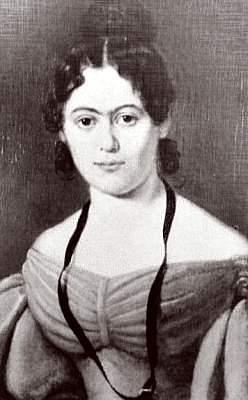
Painting of Marx's wife Jenny von Westphalen. Photo Stefan Kohn Wikipedia.
Another report on a meeting with Marx was written by Gustav Techow, a Prussian officer, who had joined the Berlin rebels in the failed revolution of 1848. Techow fled to Switzerland after being convicted and jailed for treason. The revolutionary group that Techow joined in Switzerland, sent him to London, and he spent some time with Marx.
In a letter to his revolutionary allies, Techow described his impression of Marx. He depicted a power-greedy personality, who despised both friends and enemies: "It is impossible for me to indicate to you the lively exchange of ideas, the rising warmth of the discussion, or to describe to you Marx himself dominated everything. We drank first port, then claret, that is to say, red Bordeaux, then champagne. After the red wine, he was completely drunk. And that was what I wished because then he would open his heart and reveal himself as he really was." - "He gave me the impression of both outstanding intellectual superiority and a most impressive personality. If he had had as much heart as brain, as much love as hate, I would have gone through fire with him despite the fact that he not only did not hide his contempt for me, but at the end was quite explicit about it." - "I regret, because of our cause, that this man does not have, together with his outstanding intelligence, a noble heart to place at our disposal. I am convinced that everything good in him has been devoured by the most dangerous personal ambitions. He laughs at the fools, who repeat after him his proletarian catechism, just as he laughs at (other) communists" - "and also at the bourgeoisie." - "Despite all of his assurances to the contrary, perhaps precisely because of them, I left with the impression that personal domination is the end-all of his every activity" - "And (Marx considers that) all of his old associates are, despite their considerable talents, well beneath and behind him and should they ever dare to forget that, he will put them back in their places with the impudence worth of a Napoleon."
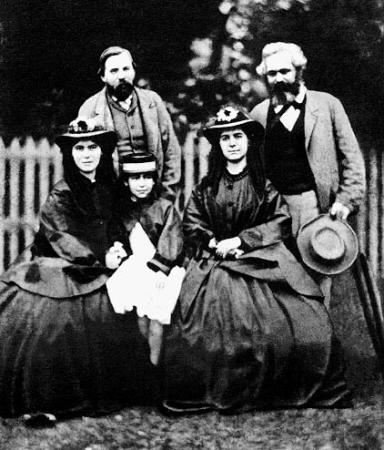
Photo of the family Marx and Friedrich Engels from 1864. Behind Friedrich Engels and Karl Marx. In front Jenny Marx and the daughters Laura and Eleanor. Wikipedia.
Jenny's and Karl Marx's three surviving daughters all married with leaders in the international socialist movement.
For many years, the family Marx's household was taken care of by housemaid Helen Demuth. She was part of the family and was not paid.
The historian Paul Johnson explains in his book, Intellectuals that Karl Marx got a son with Helen Demuth: In "1849-50" - "Helen became Marx's mistress and conceived a child." - "Marx refused to acknowledge his responsibility, then or ever, and flatly denied the rumors that he was the father." - "The son was put out to be fostered by a working-class family called Lewis but allowed to visit the Marx household. He was, however, forbidden to use the front door and obliged to see his mother only in the kitchen." - "Marx was terrified that the paternity would be discovered and that this would do him fatal damage as a revolutionary leader and seer" - "Marx persuaded Engels to acknowledge the boy privately, as a cover story for family use. But Engels was not willing to take the secret to the grave. Engels died, of cancer of the throat, on 5. August 1895; unable to speak but unwilling that Eleanor (one of Marx's daughters) should continue to think her father unsullied, he wrote on a slate: "Freddy" (the boy's name was Friedrich) is Marx's son."
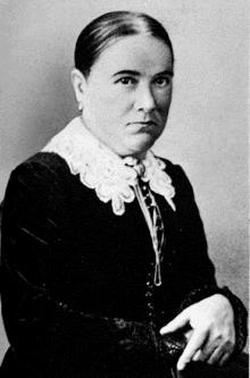
Helen Demuth photographed around 1870. She was the Marx family's maid; it is said that she received no salary but were part of the family. She was born in Saarland near Trier. Jenny's family in Trier sent her to London to help their daughter. In daily life, she was called Lenchen. Photo WikiVisually.
Karl Marx's wife, Jenny, died of cancer in December 1881, 67 years old.
Many years of smoking, alcohol consumption and irregular life had taken its duty of Karl Marx. In his last years, he was in physical decline and unable to do intellectual work. He complained much of boils, headaches, eye inflammation and rheumatic pain. The problems with abscesses were so serious that he sometimes could neither sit or stand upright. In 1877 he got a serious neurological disease, which caused long-term insomnia, which he fought with drugs.
The death of his wife and eldest daughter had taken on him. He died 64 years old in his armchair in London on March 14, 1883. He is buried in London's Highgate Cemetery.
After Marx's death, Helen Demuth moved to Friedrich Engels' home, where they worked together to complete the last two volumes of "Capital" based on Marx's notes. She died of cancer in 1890 and - after Jenny's wish - was buried in the Marx family's burial place.
Friedrich Engels died in 1895 of cancer in the throat. At his own request, his ashes were scattered in the sea off the white cliffs of Beachy Head near Eastbourne.
Marx's dialectical materialism is traditionally attributed to the influence of the philosophers Hegel and Feuerbach - dialectics from Hegel and materialism from Feuerbach.
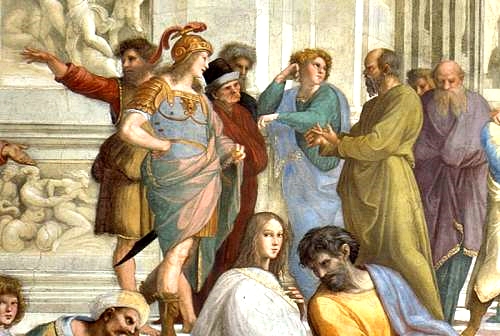
Detail from Raphael's famous painting The School of Athens in the Apostolic Palace in the Vatican. From right to left, Socrates is said to have a dialogue with a Greek, a Jew, a Roman and a barbarian. Socrates' head is painted after a Hellenistic portrait of him. Photo School of Athens.
Marx's dialectic is an idea that political, social and economic events must be understood in the light of some general historical laws called dialectics. It is Marxists' view that knowledge of dialectics allows them to anticipate social and economic events so that they can adapt their strategy and policy according to its inevitable development following these laws.
Hegel had originally got the dialectic from Plato, where it was a logical dialogue-technique, which allowed that one could find information in people, who otherwise were not conscious of having such knowledge. In this way Plato let Socrates ask a series of questions to a slave boy named Meno, who had never studied geometry and thereby showed in him an otherwise unconscious knowledge of Euclid's geometry.
Plato's method works like this: Someone puts forward a thesis, for example on the nature of justice, as he lets Cephalus in the dialogue "The Republic" say that justice means to "tell the truth and pay one's debts". The method's next step is to find a case, which is the opposite of the thesis, that usually is thought to represent justice, but does not imply that you speak the truth. This Hegel calls for the antithesis. The reconciliation between thesis and antithesis he calls the synthesis, and this becomes a new thesis, which then evokes a new antithesis and so on. By consistently applying the method, until a statement appears that satisfies both thesis and antithesis, one finally comes to a true statement about the nature of justice.

Fragment of The Republic by Plato from the third century after Christ. Photo: Poxy: Oxyrhynchus Online Wikipedia.
To continue on the track in the "State", Plato lets Socrates put the antithesis forward. He points out that if you had borrowed a weapon from a friend, who subsequently loses his sound mind and demands it back, you would not feel that it is just to give it back. Justice, in this case, would then involve that you do not pay your debt. The synthesis will subsequently become a combination of thesis and antithesis, for example, that justice is to speak the truth and pay one's debts, however not in certain cases.
For Hegel dialectic has much the same meaning as Plato. It is a logical process that goes from thesis to antithesis and further to a synthesis that combines them both. But Hegel considers dialectics to be more than a dialogue technique. For him, it is a more comprehensive process of nations' spiritual life, which is independent of the individuals, who think such thoughts.
When a nation develops - which is the thesis - it causes resistance to itself, for example, from a rival neighboring nation, which is the antithesis. Through competition and subsequent reconciliation, the synthesis is created, which becomes the new thesis, which again provokes resistance to itself in competing nations and so on until the perfect ending: the World Spirit, Weltgeist.
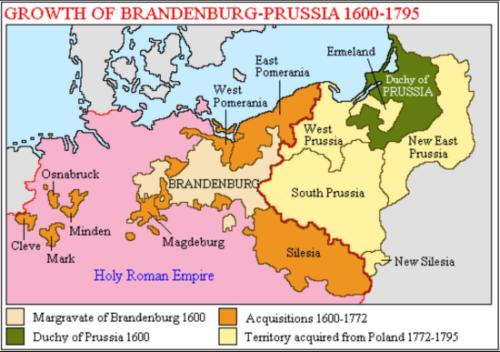
Hegel and Marx's native land was the Kingdom of Prussia that through 200 years evolved from a small state in the former East Prussia with its capital in Köningsberg, now called Kaliningrad, to also cover the whole of current East Germany and parts of Poland with Berlin as capital. At the peace after the Napoleonic Wars in 1814, the whole of the Ruhr area including the city of Trier also came under Prussia - it is not shown on this map. Photo Alphaville
At Hegel, the history begins in the Oriental and then moves to the west. The oriental world was the original thesis that met its antithesis in the form of the Greek-Roman world. The synthesis of these contradictions is again challenged by the new antithesis in the form of the Germanic world, and the synthesis becomes the Christian-German world, which is the last and highest phase of development.
For Hegel it was the spirit of the nations, "Geist", which rivaled; He probably thought about language, culture and spiritual life, which he considered to be the driving force for material development. But Marx did not like this. Inspired by Feuerbach, he wanted something more materialistic, and what could be more materialistic than production equipment and national economics? World history should not be decided by a spiritual conflict between nations, but of a physical struggle between classes.
Following the Marxists, the original ancient kingdoms collapsed because of class struggles between the king and his sworn men - the thesis - and, on the other hand, the oppressed slaves - the antithesis. Out of the conflict between these two conflicting classes emerged the synthesis, which was the fedual state, which in turn split into two opposing classes: the nobles - the thesis - and the oppressed, the serfs - the antithesis - and out of this dispute arose the synthesis, the capitalist society. And now the Marxists claim that capitalism will split into its contradictions that is between the capitalists and the oppressed, the workers, and the struggle between these classes will produce its synthesis, which will be socialism.
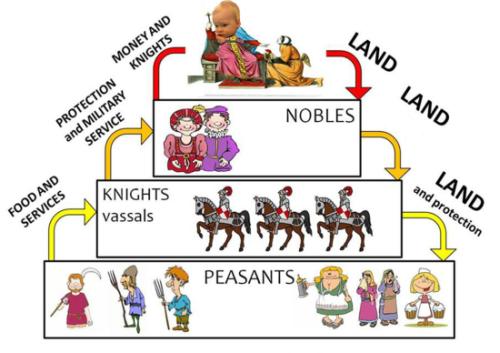
Medieval society The king was chosen by the nobles who had soldiers in the form of knights. The farmers worked the land and paid taxes and got in return protection and law and order.
That the oppressed, the slaves and later the peasants, rebelled and took power is a pure Marxist history construction. All slave riots in the Roman Empire were, without exception, beaten down. The largest slave rebellion in the Roman Empire was the Spartacus revolt, and it did not work well, they were all killed, and Spartacus himself was crucified. Jan Huss led a peasant uprising in Bohemia, but he was burned on the stake. During the Count's Feud in Denmark, some peasants joined Skipper Klement, but they lost, and he was beheaded, dismembered and exhibited on poles near the city of Viborg.
In Marx's time, the American (1775) and French (1789) revolutions were the only revolutions that had success, and it cannot be elevated to a general rule.
The American revolutionaries probably won only because they enjoyed the benefit of massive French military support. Moreover, the American Revolution was certainly not a class struggle.
Marx and Engels' assertion in the Communist Manifesto that "the history of all hitherto existing society is the history of class struggles" is not true. They just take some details from the history and blow it up, completely out of proportion.
According to Keynes, the classical economists saw sharp definitions and inalienable economic laws everywhere, but he said that "the economy of society is an unpredictable process characterized by instability" and the classical economists merely described special cases. That is why he named his main work "The General Theory" as it describes the whole economy not only the classic special cases.
Marx was also a classical economist, who studied Ricardo and Smith, and he also built his whole system on a special case, which were the natural conflicts of interest between the factory owners and the unions, and this case he gave excessive importance and used it as a basis of his whole theory.
Keynes believed that Russian communism fundamentally was a religion. He wrote in "A Short View of Russia" in 1925: "But to say that Leninism is the faith of a persecuting and propagating minority of fanatics led by hypocrites is, after all, to say no more nor less than that it is a religion and not merely a party, and Lenin a Mahomet, not a Bismarck."
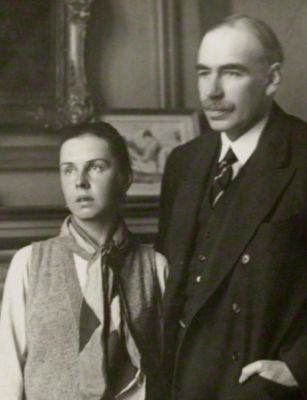
John Maynard Keynes and his Russian wife Lydia Lopokova in the 1920s. Photo Walter Benington Wikipedia.
He gave nothing for the materialistic dialectical class contradictions that drive society towards new ethical heights. He wrote in 1925: "How can I accept a doctrine which sets up as its bible, above and beyond criticism, an obsolete economic textbook which I know to be not only scientifically erroneous but without interest or application for the modern world?"
As said above, for Marx it was not a question of intellectual disputes between spiritual directions, it was really physical battles between the physical biological entities in the factories, in the streets and on the barricades.
At each synthesis, a new and better society occurred with absolute regularity, which was the former society ethically superior, it is claimed. Thus, according to Marxism, the new socialist society system will be ethically superior to all other societies that have ever existed; which statement, without doubt, motivated many to join the communist ranks, because they felt convinced that their own individual dreams of a just society fit into this very open and roomy statement of the Marxists.
To measure whether an object is longer than another, you must have a standard scale divided into authorized length-units, such as centimeter. To determine if a social system is ethically superior or inferior to another social system, one must also have a standard reference, like Christianity's Ten Commandments, Epicurus' hedonism or similar.
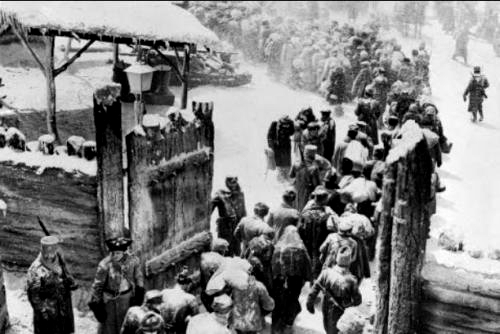
The Soviet labor camp Workuta in northern Russia. Stalin reintroduced slavery and sent millions into labor camps. Photo ebmeiersseite.
The philosophy of ethics seeks to answer two questions, which are: "What is a good life for a human?" which is closely linked to ideas of human nature and "How should a human treat other people?" In Marx's works, there are no references and no direct statements about ethical standards of any kind. Marxism's claim that socialism and communism are better than previous society systems - meaning ethically superior - is, therefore, hovering in a vacuum.
However, by all conceivable ethical measures, realized socialism in the Soviet Union, China, and Eastern Europe did not lead to increased human happiness, but it led to an extent of human suffering, not seen since the conquests of Djengis Khan in the 1200's. Stalin's purges in 1936-38 cost millions of Russians their lives. Victims of famine and persecution during Mao's Great Leap Forward and Cultural Revolution should probably be counted between 50 and 100 million.
Traditional communists have no respect for the individual and individual justice. They have often excused the actions of Stalin and Mao by saying that "one cannot make an omelette without breaking eggs". They operate with the traditional term "the masses", meaning thousands or millions of people, where the loss of a few hundred thousand is not important.
Dialectical materialism has a problem with the relationship between determinism and the free will. When nations' development with inevitable certainty progresses towards socialism and communism, why should then the individual choose to tempt death on the barricades? Socialism will be victorious anyway, even if he chooses to spend his life in a more comfortable way.
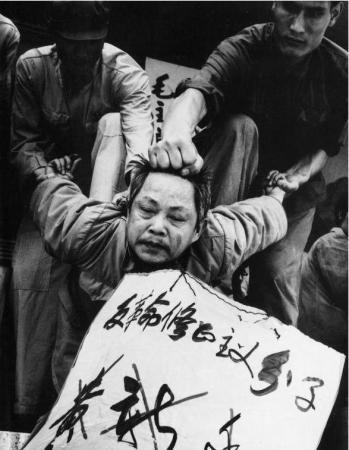
The Chinese Cultural Revolution did not represent a high ethical level. Photo REBRN.
Marx described in "Louis Bonaparte's 18. Brumaire" that society's base is governing in relation to the superstructure of society.
By base he understands the physical conditions around the means of production, that is, machines, buildings, roads, railways and so on, and the way work is organized, that is economic systems, property and the like. The superstructure of society means culture, literature, political ideas, philosophy and so on. Therefore, he said, society's base, the development of the means of production, determines the superstructure; that is all the thoughts and ideas that pop up in the individual's consciousness. The "development of the means of production" is, therefore, the first cause, and the thoughts of the individuals are the effects of this cause. Therefore, society's basic will inevitably make individuals to get the idea that capitalist society is unjust, and that will motivate them to enter the barricades.
Such an idea that the machines and production facilities came first, and the humans' thoughts are functions of these, is absurd and deeply unsatisfactory.
Plants in the wild germinate without human involvement, but all the phenomena of human society happen because some people want it that way. We must think that all production equipment and the organization of the production process have been in the mind of a human, before it is realized; The thoughts came first, and the change of matter came afterward. If the machines are changing themselves and this is cause of changing the thoughts of the humans, then we are talking about: "Rise of the Machines" - "the materialist conception of history" is simply not true.

The Rise of the Machines. Photo Warwich Business School.
But a social worker may feel the Marxist idea that the individual's thoughts and ideas are generated by their relation to society's basis, "the productive forces", quite appealing. She probably long has felt that the problems of her clients are not their own fault.
The division of labor, the alienation and the wage-slavery in order to make surplus value for the capitalists are for Marx the three great evils of capitalism. He does not talk much about equality, but it must be assumed that the abolition of wage labor will eliminate the inequality between those who have and those who do not.
The workers' longing to free themselves from these evils - despite Marx's idea that the basis of society is governing - is believed to be the decisive motivation for the socialist revolution. The absence of these evils in Marx's fantasy of the final communist society of the future is believed to justify the claim of its ethical superiority.
The division of labor is for Marx the very essence of everything that is wrong with the world. It is contrary to man's true essence. It pitches a man against his fellow men; it creates alienation, it creates class differences; it destroys the unity of humanity.
Marx claims that in such production systems that contain alienating divided work, the very vitality of human life is stolen from the workers.
Adam Smith described in 1776 how the division of labor in a pin factory led to an unprecedented rise in production. The traditional way was that each worker individually manufactured pins from steel wire to the finished needles. Smith described how the production process was now divided into wire drawing, cutting, pointing, etc. which were then carried out by separate workers, who had specialized in each process. The new division of labor led to that the factory could multiply its production. Similarly produced Henry Ford in 1908 his Ford T model on assembly lines where the assembly process had been divided into sub-processes along the line.
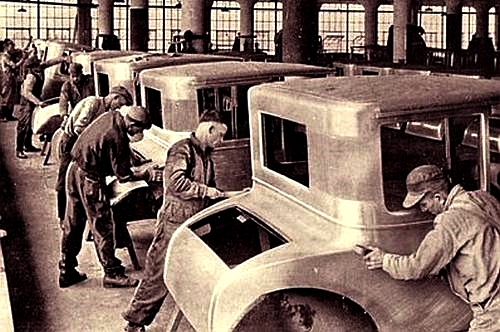
Division of labor on assembly lines in the Ford Factories at the beginning of the 1900's.
It is easy to understand that it may be monotonous to stand at such an assembly line for many hours and perform the same movements. But today there are not many of these kinds of jobs left. Such processes are everywhere replaced by robots and other automation.
But Karl Marx was not only opposed to that kind of labor division. He believed that any labor division and specialization in general was harmful to humans. In his communist paradise, there will be no metal workers, shop assistants, doctors, teachers, professors, football players or engineers. Everyone will be able to perform all jobs and change as often as they like.
In The German Ideology he wrote: "For as soon as the division of labor comes into being, each man has a particular, exclusive sphere of activity, which is forced upon him, and from which he cannot escape. He is a hunter, a fisherman, a herdsman, or a critic, and must remain so, if he does not want to lose his means of livelihood; while in the communist society, where nobody has one exclusive sphere of activity, but each can become accomplished in any branch he wishes, society (?) regulates the general production and thus makes it possible for me to do one thing today and another tomorrow, to hunt in the morning, fish in the afternoon, rear cattle in the evening, criticise after dinner, just as I have a mind, without ever becoming hunter, fisherman, herdsman or critic."

When the future realized communism comes, Messi can say goodbye to his lucrative job as a football player. He will no longer be special. All specializations will become things of the past, and anyone will be able to perform all jobs just as well as everyone else. Foto Jeevanipedia.
Obviously, he believes that man naturally is longing for constantly learning new skills and acquiring new knowledge. This is most likely true in a certain sense, it is always exciting to hear news. But today the total amount of human knowledge and skills is so huge that it is wildly unlikely that there will come anything good from that individuals completely will change careers every few years - not to mention every few hours, as Marx suggests. In the real world, changing career only once a lifetime will set a man back.
Moreover, human beings will want to master their specialty to perfection - as Messi does - to get the intellectual satisfaction of fully exploring and mastering their speciality in order to secure their position in the community and increase their reputation and ranking within the community.
It is a hopeless and really distant utopia to believe that the new communist man - freed from alienation and wage slavery - will have such intellectual, practical and creative qualities that they will be able to fill any position they please, be it surgeon, cook, machinist, researcher, painter, author, football player, engineer - all you can imagine.
In the realized communist paradise of the future, we all in this way will end up being some self-important semi-educated amateurs, who only in our own imagination will master our expert area satisfying.
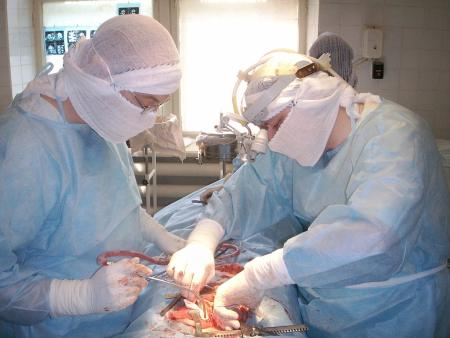
Marx imagined that when the individuals are freed from the heavy yoke of labor division, alienation and wage slavery, their intelligence and responsibility will flourish, so that they can take on any work that others can do. Anyone can thus become excellent surgeons if they want to. Photo Berolga73 Wikipedia.
Who wants to have an operation for a life-threatening illness by a surgeon, who only recently has started in this profession, because he found his previous job as a mechanic boring?
In the modern world, the total amount of knowledge is constantly increasing - probably exponentially. No one can know everything, and therefore the trend is towards ever more specialization. The new Danish super hospitals will probably heal patients safer and more effective than the hospitals that are being replaced because the more specialized doctors will be greater experts in their respective specialties - than the less specialized doctors.
The Marxist idea of alienation describes that the worker is believed to feel a distant and uncommitted relationship to his work and the products that he produces - or to himself. The reason for the alienation is thought to be that the worker does not own the products and that he must adjust his work according to rules, standards and deadlines, which he has not himself determined, including division of labor, and thus he is unable to "manifest his life and personality " in the product.
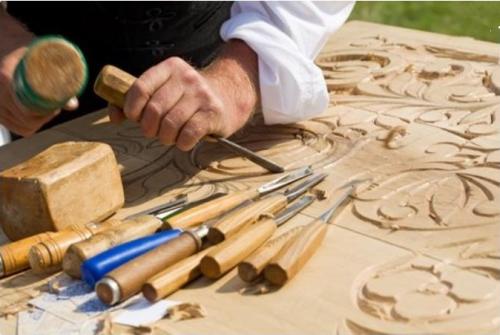
In the future communist society, all work will be much more individualistic According to Marx, the worker will perform his production "as a human being" and "objectify" his individuality in the process. In fact, he must mean that we all become artists or craftsmen to some extent. Photo Rod Sullivan.
Marx says that in the capitalist mode of production the laborer has no possibility to control his own actions. He can not express himself and his personality in the products that he produces with his own work, he does not own these products and can not create a human connection with others by meeting their needs by selling them his products.
Alienation exists, especially in jobs with many monotonous repetitive procedures, as there were many in Karl Marx's time. But the solution is far from always making the employee into a kind of artist or craftsman.
Marx describes in "Comments on James Mill", how a non-alienated worker would be a sort of artist or craftsman, who manifests his life and personality in his product. By reviewing the product, he confirms his objective existence and personality. He will feel happy by establishing a personal relationship with the consumer, who buys the product by fulfilling his needs: "Let us suppose that we had carried out production as human beings. Each of us would have in two ways affirmed himself and the other person. In my production I would have objectified my individuality, its specific character, and therefore enjoyed not only an individual manifestation of my life during the activity, but also when looking at the object I would have the individual pleasure of knowing my personality to be objective, visible to the senses and hence a power beyond all doubt. In your enjoyment or use of my product, I would have the direct enjoyment both of being conscious of having satisfied a human need by my work, that is, of having objectified man's essential nature, and of having thus created an object corresponding to the need of another man's essential nature." - "In the individual expression of my life I would have directly created your expression of your life, and therefore in my individual activity I would have directly confirmed and realized my true nature, my human nature, my communal nature." - "Our products would be so many mirrors in which we saw reflected our essential nature."
As I said, he talks about human nature, as if it were something everyone agreed on, but he never becomes concrete.

Working as a pilot is likely to be the prototype of alienated work. Pilots are not expected to be creative or to "objectify their individuality" in their work. They must be disciplined and able to read a manual and follow it to the letter, and they do not own the airplane - everything that Marx condemns as alienating. But in the full communism of the future, there will be a cure for all this, the alienation will disappear, and the pilots will be allowed to be "human beings" and objectify their personality and creativity in their service. Photo North Central Texas Council of Governments.
Logically, alienation is a relation, that is, one must be alienated from someone or something, you can not just be alienated, as you can not kill without killing someone. Marx says that human beings are alienated from themselves and from nature.
It must be understood that he believes that due to production conditions, human beings are alienated from a form of human nature.
However, this causes additional problems as Marx does not anywhere operate with an unchanging or just roughly defined human nature. On the contrary, Marx's human being is a kind of consciousness chameleon that adapt to the production conditions as he writes in "A Contribution to the Critique of Political Economy": "It is not the consciousness of men that determines their being, but, on the contrary, their social being that determines their consciousness." Or in "Theses on Feuerbach": "But the human essence is no abstraction inherent in each single individual. In its reality it is the ensemble of social relations."
If we take Marx at his word then in that case, a feudal society - characterized by feudal social conditions - would produce a feudal "human nature" in perfect harmony with society, and a capitalist society - characterized by capitalist social conditions - would produce a capitalist "human nature", and it would never be the case that a contradiction between society and man's pursuit of justice and happiness in accordance with their human nature will be a revolutionary driving force in the development or improvement of society, as Marxists tell us otherwise.
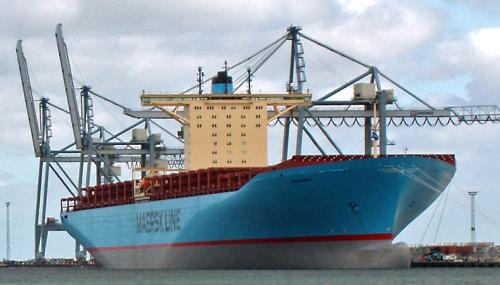
Emma Maersk in the port of Aarhus. Building and operating ships is very different from art-crafts. They are designed and built by hundreds of specialists, who are responsible for each of their area. It is needed that all stay within a host of precise guidelines, specifications, standards and deadlines, which are determined in advance, in order to end up with a usable ship. It must be the very manifestation of marxist alienation. But it is in this way that Western men work together creating large engineering deeds: ships, airplanes, space stations and much, much more. Photo Nico-dk Nils Jepsen Wikipedia.
Some writers compare Marx with a child, who wants everything but does not want to pay the price. He would like to have the wealth and abundance that modern industry with its wage labor and specialization can provide him with, but he does not want to specialize himself - and thereby give up the freedom to choose between all the other options - or work for others.
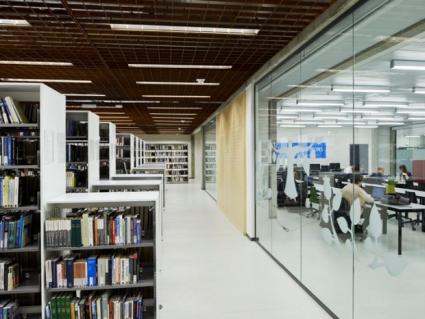
The world's total knowledge is constantly growing, probably exponentially. Only Southern Denmark University Library has no less than 24-kilometer shelves of books and journals. It is quite unthinkable that it can be managed or utilized without specialization. Photo Byggeplads.dk.
In the modern world a working life in a small workshop, where the individual can fondle for the product and put all his soul and personality into it, is only possible for very few artists and craftsmen. Perhaps practitioners and dentists, who work for themselves and themselves do everything from start to finish also can feel that kind of satisfaction. But one should not be blind to that such working life - without much interference from others - also can be lonely. Moreover, the present lack of practitioners does not suggest that it is a sought-after life.
Today's industrial products can be very large and complex and must necessarily be produced by many in complicated collaboration, which implies many limitations for the individuals in terms of specifications, sectional divisions, standards and deadlines; Just think of ships, medicine, IT and wind turbines. But it is in this way that all the Western world's engineering feats are created, and it is such that Western men work together.
The European man's technical success proves that he have not been particularly hampered by alienation. On the contrary, the human being is a social animal, who wants to have a place in a group, humans will feel happy by the consciousness of doing their duty, and they appreciate the recognition by others.
Marx has a problem with the relationship between community and individualism; he does not know which leg to stand on. He tells us time and again that the proletarian workers are immensely social and want nothing more than to do everything in common. However, when they actually come together to implement large projects, they will be hampered by alienation, because they can not stand overall guidelines, specifications, standards, control and deadlines, as these impede their ability to be "human beings" and "objectify their individuality" in the product.
Karl Marx analyzed the value concept and the exchange between goods and money. He operated with different value categories. Economic value that corresponds to the value of the work that is embedded in the product. Use value, which is the item's value in daily use, which is difficult to quantify. Exchange value, which represents, what the market at any time is willing to pay for the product.
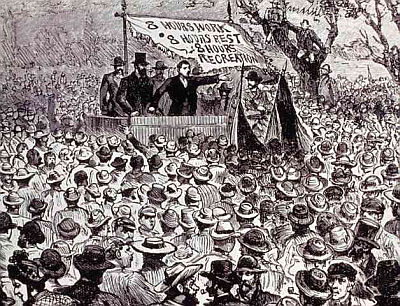
English workers meeting in the 1800's. We can believe that the European workers' movements were quite pleased to get a scientific argument that they should have more in pay.
He defines the economic value from Adam Smith's theory that the value of a commodity is obtained from the amount of work that is embedded in it. The size of this he defines from David Ricardo's iron law of wages, which says that the natural price of labor depends on the price of food and necessities required to support and reproduce the worker and his family in the days or hours when he works on the product. That is a kind of existence minimum.
However, the capitalist does not sell his goods for the economic value, he sells it for the exchange value, which differs from the economic value. Marx says in Capital: "Exchange-value appears first of all as quantitative relationship, the proportion in which use-values of one kind are exchanged for use-values of another kind, a relationship which constantly changes in accordance with time and place." Which must mean that he recognizes that the exchange value - that is the market price - varies over time and place.
Because of the capitalist's timing and planning the exchange value will generally be greater than the economic value, that is the sum of labor costs, which are embedded in the product. The difference between those he calls surplus value. It goes entirely to the capitalist as profit or gain, and the marxists think that this is not fair.
It is not entirely clear what Marx means by work and workers. Based on his choice of examples, we get the impression that he believes that only direct manual work in the production adds economic value to the product.
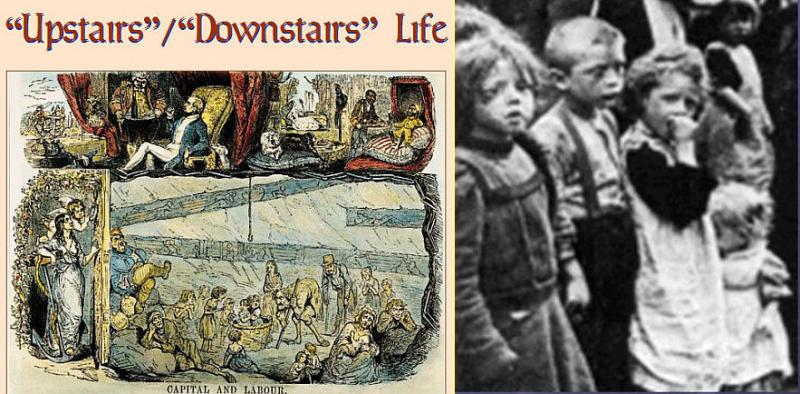
|
Left: Poster from the 1800's: "Upstairs and downstairs life". This was also the period, when Charles Dickens wrote Oliver Twist and many other novels, defending the poor and attacking those, who exploited poor children. His contemporary, H.C. Andersen, wrote "The little girl with the Matches."
In principle, the English workers were paid after David Ricardo's "Iron Law of Wages", that is, existence minimum, but could include a bottle of gin for festive occasions. One would think that there would not be enough customers in the shop, who asked for the English industry's products when the workers had no money. But the English industry and especially the city of Manchester was the World's workshop. They produced to the whole world, and it was not a very big problem that domestic demand was not particularly high. It was not a need of national economy to pay high salaries. Large fortunes were made.
It is said that the modern Chinese economic strategy is an imitation of the 1800's English strategy.
Right: English working class children.
However, in real life products indirectly receive value from many experts and professionals. Engineers and technicians design the product and the entire production process; purchasers, planners, accountants and sellers make the whole process possible. Yes, the capitalist himself adds overall management and planning, which is also work, indispensable in the long term. When these labor-costs are included, Marx's surplus-value is reduced significantly.
In the individual company, direct work in production represents only part of the costs. Other costs may include depreciation, raw materials, energy, various consumables and semi-manufactured products purchased from other businesses, where they again are manufactured using direct work, and purchased parts and consumables, again purchased from other companies - and so on backward throughout the enrichment process.
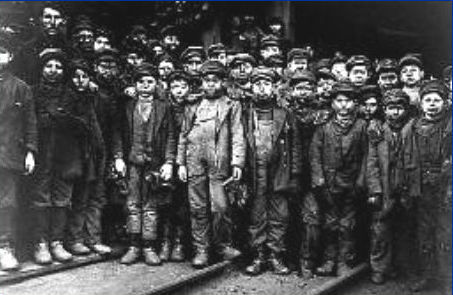
English working boys in a coal mine.
It is not entirely clear, whether Marx believes that the products only get economic value from added work in a particular company, or economic value is created by added work back throughout the processing operation in the sequence of supplier-companies.
In the beginning were the forests, the mountains and the plains. But then humans came and started working. They felled the trees and made houses and ships; they dug in the mountains and extracted ore that they worked into plows and swords; they plowed the plains and sowed wheat. It is the work of humans, which has transformed the virgin planet to the one that we know today.
Let us be fair and assume that he believes that labor is accumulated into the economic value throughout the processing operations from the ore in the mountains and crops on the fields to the finished advanced product. In this way, all costs, including depreciation, auxiliary materials and semi-manufactured goods, will also represent added work and further reduce surplus value.
Marx's theory of surplus value has been countered by Ludwig von Mises, who points out that there is a time difference between the capitalist's investment and payments of costs and the customers' payments related to the final sale, which justifies an interest. In addition, customers are treacherous and unpredictable; there is a risk of investment projects, which should be rewarded. This will further reduce Marx's surplus value.

Marxists say that surplus value is not to be understood as profit, gross profit or the like, but when deducting unit costs from corresponding sales revenue, it must be a form of contribution margin, gross profit or profit, no matter what they call it. Their claim, that the workers are being cheated of the surplus value, therefore resembles a demand to have this margin to the workers' disposal.
If we assume that historical work throughout the sequence of processes - including subcontractors' subcontractors - is calculated in the products economic value, all material consumption and depreciation on machinery and buildings will be included in the economic value, as everything is created by work, when we go enough backward in the processing processes. The surplus value will then be equal to gross profit or profit - which is a pretty trivial. message.
Marxists will probably reject that the surplus value theory can be likened to a usual accounting result - as above. They will argue that it is not the same at all, and that the surplus value theory represents something much deeper and more philosophical. But it is only a veil of smoke with the purpose to hide that the emperor is not wearing any clothes.
Marx never mentions Rousseau, but it is apparent that his division of people into classes - defined by ownership or lack of ownership of the means of production - recalls Rousseau's cry for justice a hundred years earlier in his: "Has the restoration of art and science had a cleansing effect on morality?": "The first man who, having enclosed a piece of ground, bethought himself of saying This is mine, and found people simple enough to believe him, was the real founder of civil society. From how many crimes, wars and murders, from how many horrors and misfortunes might not any one have saved mankind, by pulling up the stakes, or filling up the ditch, and crying to his fellows, "Beware of listening to this impostor; you are undone if you once forget that the fruits of the earth belong to us all, and the earth itself to nobody."

|
Illustration of Rousseau's state of nature. Photo: The Purity Spiral.
In "Discourse on the Origin and Basis of Inequality Among Men" Rousseau describes all the forms of inequality that exist among humans. His goal is to determine what kind of inequality is "natural", and what is "moral" - thus unnatural - and thus ethically reprehensible.
He assumes that men originally lived in a happy state of nature, where the only disparities were the natural differences, including differences in physical strength, beauty and intelligence. But, at some point the state of nature, developed into a little more complex society with division of labor and private property, which made it possible for landowners to dominate and exploit the poor. Rousseau states that this situation is intolerable to the poor, who will naturally seek to wage war against the rich in order to end their unfair dominance.
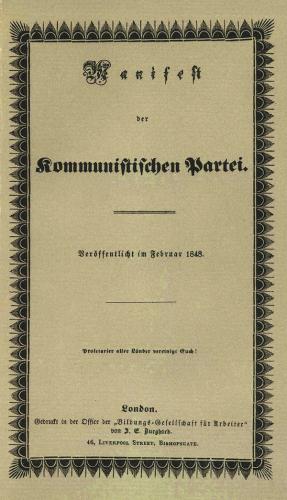
"The Communist Manifesto" was written by Karl Marx and Friedrich Engels and was first published in London on 21. of February 1848. Wikipedia fra www.marxists.org.
Marx takes up the thread in the Communist Manifesto: "The history of all hitherto existing society is the history of class struggles. Freeman and slave, patrician and plebeian, lord and serf, guild-master and journeyman, in one word, oppressor and oppressed, stood in constant opposition to one another, carried on an uninterrupted, now hidden, now open fight, a fight that each time ended, either in a revolutionary reconstitution of society at large, or in the common ruin of the contending classes."
At the end of the Communist Manifesto, he follows up with an open declaration of war on behalf of the working class against the enemy class: "The Communists disdain to conceal their views and aims. They openly declare that their ends can be attained only by the forcible overthrow of all existing social conditions. Let the ruling classes tremble at a Communistic revolution. The proletarians have nothing to lose but their chains. They have a world to win. Working men of all countries, unite!"
Marx's division of the people into classes - according to who has and does not has ownership of the means of production - is not particularly original, having it from Rousseu, though he never mentions Rousseu.
Communists believe that this division is paramount to the quality of their political decisions. The whole of Marxist theory and politics depends entirely on the relevance of this division.
Of course, it is theoretically possible to divide the population into two groups according to whether they own means of production or not, one can not say that such a division is not true. But the question is whether it is as relevant and important for decision making and the development of society as the Marxists claim. It will probably be far more relevant to the quality of political decisions regarding the future of our country to divide the population into Muslims and Christians, women and men or old and young.

Many workers are homeowners. Photo Real Estate.
In the modern world, it is a gross generalization to divide the population in a working class, who receive wages or salaries, and a capitalist class that owns land and property, earning profits, interest and dividends.
Most workers - blue or white collar - are also some kind of capitalists. They have pension savings, either in different companies or funds, or they own personal shares and bonds that hopefully give profits, interest and dividends. The majority of employees own a piece of land with their own house or apartment, which constantly rises in value and will return a profit in the form of "exchange value" when it one day is sold.
To manage a business is an honest and useful work that deserves a reward, which one does not have to condemn, simply because the reward is paid in the form of profits.
In the individual company, owners, managers and employees share a common interest in that the business is doing well and creates long-term revenue that will enable stable employment, future payroll and earnings payouts and in general ensures a good life for all, who are affiliated with the company.
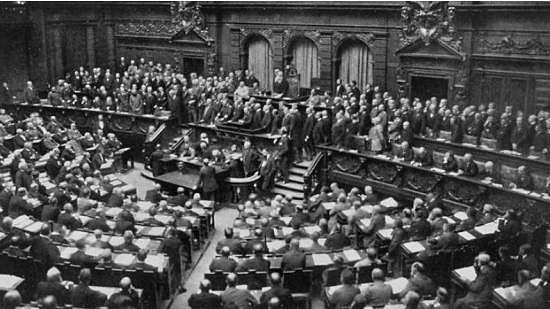
An unanimous German Bundestag vote for war credits in 1914, including the German Social Democrats. In August the British Labor party followed suit and voted for the war credits in the English parliament. Photo Deutscher Bundestag.
The call: "Working men of all countries, unite!" illustrates another important feature of the Marxist class concept, namely that the workers are believed to have more in common with workers in other countries and continents than they have with their own countrymen, who do not belong to the working class. They are expected to have common interests and greater loyalty to the international socialist cause, than with their own people and their own nation.
His call: "Proletarians of all lands, unite!" is not good advice for the people of the world. They will not be more happy, by being united in gigantic empires, not even in socialist empires, such as the Soviet Union or the People's Republic of China. Humans will probably be happiest in small ethnically and culturally homogeneous nations, where each people can live in accordance with their own culture and religion.
Communists thus expect that all peoples and nations will be split into classes and the pieces after some time to be reorganized in the communist paradise.
But a worker - blue or white collar - has much more in common with his countrymen, the other Danes, than he has with workers from distant nations, whom he never met and does not know. He shares a common Danish language and a common culture, which produce mutual trust because we know each other. He has a long and eventful history, literature, music, songs, movies and poems in common with the other Danes. When he sees himself in the mirror, he can recognize an ethnic appearance, which he also has in common with most other Danes.
The only things a worker - following the marxists - may have in common with some poor people from remote countries are some abstract ideas that only a minority think they understand.
The working class' international solidarity broke down miserably at the outbreak of First World War I in 1914. Socialists and Social Democrats in all countries ended up joining the ranks of their own nations and voted for the war credits.
"Man creates religion, religion does not create man", Marx wrote in "Critique of Hegel's Philosophy of Right", and he continued: "Religion is the sigh of the oppressed creature, the heart of a heartless world, and the soul of soulless conditions. It is the opium of the people."
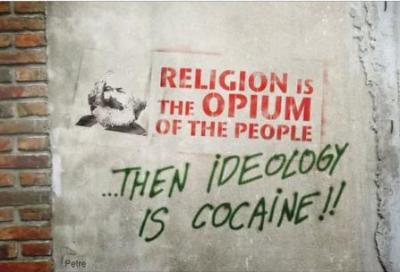
Religion is opium for the people, it is said, but Marxism is also a kind of religion, even if they claim it to be a science. Photo Paradox of the Day.
The young Karl received very little religious influence during his childhood, and already at an early age he refused to believe in an almighty God. But later in his career he introduced the "Historical Necessity" - determined by the inevitable development of "the means of production" - and which inevitably drives the course of history towards the communist paradise.
The famous British economist John Maynard Keynes visited Communist Russia in 1925 and wrote the short article "A Short View of Russia".
As an economic system, communism, in his view, was utterly hopeless: "How can I accept a doctrine which sets up as its bible, above and beyond criticism, an obsolete economic textbook which I know to be not only scientifically erroneous but without interest or application for the modern world?"
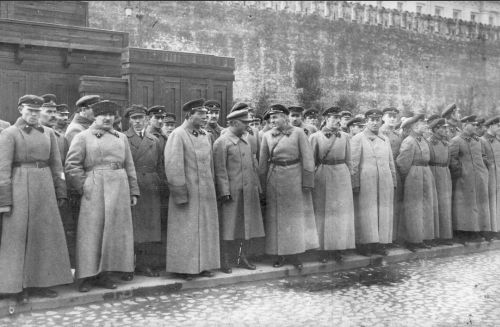
Soviet officers on Red Square in 1925. Photo vedomstva-uniforma.ru.
But as a religion, he thought it could be very dangerous because the West was culturally completely disarmed. He wrote: "For modern capitalism is absolutely irreligious, without internal union, without much public spirit, often, though not always, a mere congeries of possessors and pursuers. Such a system has to be immensely, not merely moderately, successful to survive." - "If irreligious Capitalism is ultimately to defeat religious Communism, it is not enough that it should be economically more efficient - it must be many times as efficient."
Keynes was not for a moment in doubt that communism itself functions primarily as a religion:
"Like other new religions, Leninism derives its power not from the masses, but from a small minority of enthusiastic converts, whose zeal and intolerance make each of them equal in strength to a hundred indifferent."
"Like other new religions, it seems to take the colour and gaiety and freedom out of everyday life and to offer a drab substitute in the square wooden faces of its devotees."
"Like other new religions, it pursues without justice or compassion those who actively oppose it."
"Like other new religions, it is unscrupulous."
"Like other new religions, it is filled with missionary ardour and occumenical ambitions."
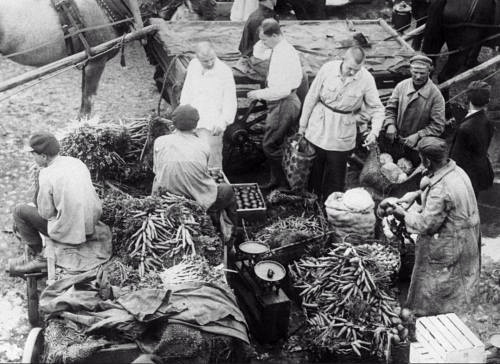
Market in Moscow 1925. Photo Twitter.
He predicted that "if Communism achieves a certain success, it will achieve it, not as an improved economic technique, but as a religion."
Marx's idea that the dialectics constantly and necessarily drives the historical development towards new ethical heights has sunk to the bottom of the minds of peoples. It is behind the term "progressive" describing politicians, who are positive towards immigration, homosexual rights, increased transfer incomes and similar - opposed to "reactionaries", who stubbornly oppose the inevitable development towards an alleged increasingly humane and tolerant future society.
It has become a sort of unconscious religious conviction that development of society is moving from a brutal past against a future of ever higher ethical levels. "We must keep up with the development", "modern people think so and so" or "after all, we live in the 21. century", it is said.
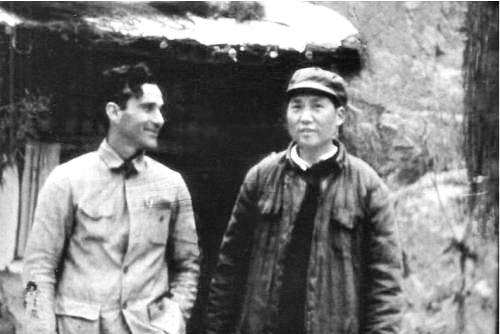
American journalist Edgar Snow with Mao Zedong in Yenan 1936. Mao explained to him that - unlike the Western Communist parties - the Chinese Communist Party relied on the peasants and not the working class. Photo oploaded by Priscilla Roberts.
Marx predicted that capitalism would become increasingly economically unstable, that the class struggle between bourgeoisie and the proletariat would intensify making the proletariat more numerous and more poor until the workers in a major social revolution took power and embarked on the new communist phase of history.
It is a fact that this did not happen in the major capitalist countries, the United Kingdom, France, Germany and the United States. On the contrary, the capitalist system has become more stable, and for the vast majority of the inhabitants, the living conditions have become far better than they were in Marx's time.
Moreover, the countries where a communist revolution took place, were countries that had experienced little or no industrial development, such as Russia in 1917, Yugoslavia and North Korea in 1945, China in 1949 and Cuba in 1959. Thus, these were countries where there was only a negligible or no working class at all in Marx's sense.
Marxists have sought to counter these arguments by claiming that the West's working class has been bribed with higher wages, which is clearly a very poor argument as no one has any obligation to make revolution that can be corrupted by bribery and it is also absurd and confusing to call a raise in salary for bribery.
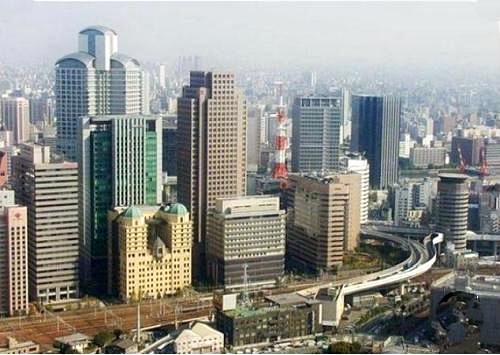
Downtown Lagos in Nigeria. Foto Pinterest.
Many Marxists argue that the colonies, i.e the developing countries, have acted as a proletariat in relation to the industrialized countries. This is also not a good argument, since many of the industrialized countries had no colonies of importance - such as the Scandinavian countries.
Furthermore, anyone who watches TV or photos from - for example - the African nations, cannot avoid to notice that these countries must have experienced dramatic technological development over the last hundred years.
A very large proportion of inhabitants of such countries no longer live in mud-clad huts and no longer live by sucking the blood from their cows.
They have modern technology, cars, roads, modern buildings, excavators, diesel engines, air-conditioning and much more, all of which they have come to know thanks to contact with Europe and the US through colonization and globalization. Their current problems are not due to economic exploitation or lack of technological development, but to a dramatic population growth for which they themselves are responsible, as they are now independent states.
Marx divides the communist society of the future into two phases.
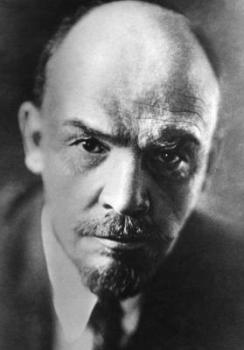
Wladimir Iljitsch Lenin described how a determined minority could seize power in a revolutionary situation, that is in a period of a temporary power vacuum, in this case, because of Russia's military defeat to Germany, horrible losses at the front and famine. Lenin introduced the dictatorship of the proletariat in the form we came to know in the Soviet Union, East Europe and China. Lenin's proletarian dictatorship was special by that an exclusive self-established group, the Communist Party, ruled on behalf of the proletariat. Photo Bundesarchiv.
The first phase he calls in "Critique of the Gotha Programme" for the "dictatorship of the proletariat": "Between capitalist and communist society there lies the period of the revolutionary transformation of the one into the other. Corresponding to this is also a political transition period in which the state can be nothing but the revolutionary dictatorship of the proletariat."
The second phase is the actual communist society that he usually calls "full communism".
D. Phil Bertell Ollman from Wisconsin states quite reasonable that in Marx's time the term dictatorship was not as negatively charged as today: "Before Hitler and Mussolini the meaning of "dictatorship" was strongly influenced by its use in ancient Rome, where the constitution allowed the election of a dictator to perform certain specific tasks for a limited period, generally in times of crisis."
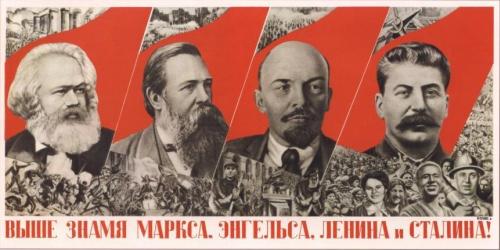
Soviet poster trying to illustrate that Lenin and Stalin ideologically stand on the shoulders of Marx and Engels, and the dictatorship of the proletariat in the Soviet Union was the realization of Marx's and Engels's thoughts.
It was the claim that Leninism was a logical continuation of Marx and Engels' ideas of the rebellion of the oppressed, which gave Soviet communism the immunity to criticism that made its survival possible despite Moscow processes, Gulag camps and countless other misdeeds. In fact, there is no conspicuous logical connection between Marx's idea of the revolt of the masses and Lenin's elite party.
The idea of a society led by an exclusive self-supplementing elite is in fact more related to Plato than to Marx. Lenin's and Stalin's works are soaked with phrases of dialectic and materialism, but Soviet politics, like any other policy, was probably in practice more inspired by Machiavelli than of Hegel's, Marx's and Engels's dialectics and Feurbach's materialism. In fact, Machiavelli's "The Prince" was contained in Stalin's personal library. Photo Travel Posters Online.
The dictatorship of the proletariat is intended as a transitional period during which the victorious working class will eradicate the last remains of the capitalist society and prepare the final transition to full communism
The dictatorship of the proletariat has features in common with both capitalism and full communism, and Marx never suggests how long this period will last. In the Communist Manifesto, he lists 10 points that the victorious working class immediately must put in place, and they give us an idea of what he meant by this transition-period to full communism:
1. Abolition of property in land and application of all rents of land to public purposes.
2. A heavy progressive or graduated income tax.
3. Abolition of all rights of inheritance.
4. Confiscation of the property of all emigrants and rebels.
5. Centralisation of credit in the hands of the state, by means of a national bank with State capital and an exclusive monopoly.
6. Centralisation of the means of communication and transport in the hands of the State.
7. Extension of factories and instruments of production owned by the State; the bringing into cultivation of waste-lands, and the improvement of the soil generally in accordance with a common plan.
8. Equal liability of all to work. Establishment of industrial armies, especially for agriculture.
9. Combination of agriculture with manufacturing industries; gradual abolition of all the distinction between town and country by a more equable distribution of the populace over the country.
10. Free education for all children in public schools. Abolition of children's factory labour in its present form. Combination of education with industrial production, and so on.
As seen, several of the items have already been implemented in Denmark and other European countries. Tax is already charged after a heavy progressive scale, inheritance is burdened with extremely high taxes, national banks are established, state and municipality have taken over the upbringing of children. This is accomplished by political parties, which consider themselves as democratic, to finance popular welfare services.
Precisely in a democracy, it is possible to get other people's money by voting; Political parties, which lead such a policy, lose a few votes from the small groups, from which the money is taken, but win more votes from the much larger groups, to which the money is distributed in different ways.

In a democracy it is possible to vote for other peoples' money. Politicians, who advocate such action, is often called progressive, suggesting that will lead society towards the alleged inevitable higher ethical level of the future, as predicted by Marx. Photo Ola Betiku.
"The establishment of industrial armies, especially in agriculture", which together must do the work previously done by farmers on their own fields. Which, as we know, was introduced in both the Soviet Union and China with disastrous results.
The manifesto states that the aforementioned 10 points in no way will replace Marxism's long-term goals: "The proletariat will use its political supremacy to wrest, by degree, all capital from the bourgeoisie, to centralise all instruments of production in the hands of the State, i.e., of the proletariat organised as the ruling class."
In fact, Marxism's goal is to abolish all private property, as Marx explicitly states in "Critique of the Gotha Programme": "Nothing can pass to the ownership of individuals, except individual means of consumption." Which was also what happened in the Soviet Union and the People's Republics, which led to significantly less productivity compared to the Western European nations.
The crucial question in political philosophy is "Who should rule?" Plato and Thomas Hobbes believe that the few should rule, while Jean-Jacques Rousseau, John Locke and John Stuart Mill believe that the many should rule. Karl Marx certainly also leans against the many; The very term "proletariat" must be assumed to describe a majority.
But the actually existing socialism in the Soviet Union, Eastern Europe and China was not ruled by a majority. It was ruled by an exclusive elitist minority on behalf of the proletariat. The energetic Marxist-Leninist parties were invented by Lenin. The political model for the Soviet Union, China and the People's Democracies was more in line with Plato than with Marx, even though they invoked Marx and Engels as their political philosophers - and thereby disarmed a large part of the criticism of their numerous misdeeds, for who will oppose the poor demanding their fair share?
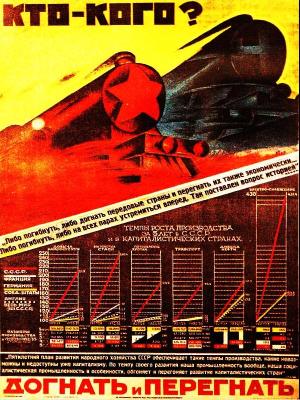
Throughout the lifetime of the Soviet Union, the Communist Party issued propaganda about constant growth. This was however punctured in 1988 by Mikhail Gorbatsjov, who showed that the Soviet Union did not experience growth for the past 20 years. Photo Yaplakal.
In 1988, Mikhail Gorbachev presented a report to the party congress in Moscow, which said that the Soviet economy had not grown for twenty years with the exception of vodka sales and the higher prices paid for Soviet oil. These estimates were given to the Congress, although other reports throughout these twenty years had informed central committee and congresses about annual growth rates between two and five percent.
The Soviet economy - and by all accounts also the Chinese and East-European planning economies - had trouble with reporting systems, planning and motivation.
The Soviet Union wasted its resources because the success indicators for Soviet leaders made it possible for them to have success, though their production was poorly related to consumer needs. Their reports quantified production using such indicators as weight, volume or surface area.
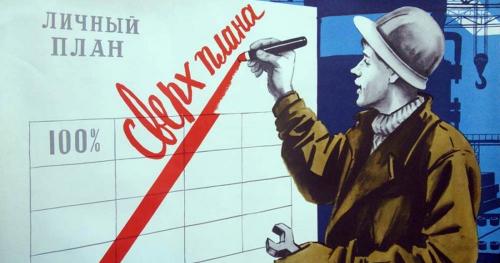
Soviet propaganda poster telling about economic growth. Photo Nastroy.net.
This means that for example, a toy factory could report that they had produced so and so many ton of toys that exceeded plan target, which was also noted in number of ton; therefore it was considered successful and the leaders could be rewarded; but in reality they had designed the toys with an excessive amount of material and had not produced very many.
Nikita Khrushchev complained about chandeliers so heavy "that they pull the ceilings down on our heads". The manager of a nail factory received the Lenin order for exceeding the production target in tonnes, but in reality, the nails were far too big for practical use. A famous Soviet satirical drawing showed two giant cranes, which lifted a huge nail.
There were never any Western economists, who figured out how the socialist planning system worked. The thing is probably that it didn't work. The "central plan" was little more than the sum of the individual factory managers' plans added the acceleration of specially selected projects at the expense of other projects.
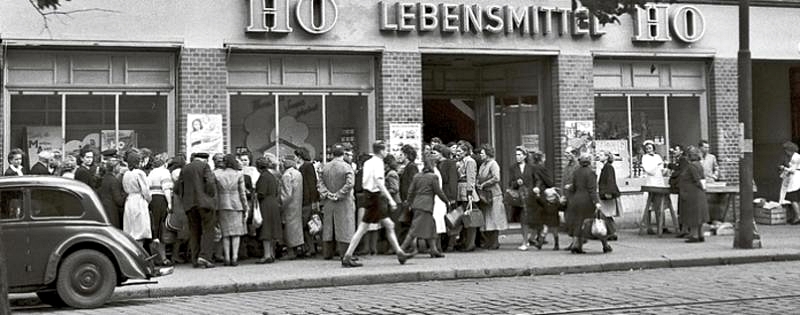
|
Waiting line in front of a food shop in the DDR. The citizens of the DDR were not lacking money, but they could not buy anything for them. That's why the black market flourished. Photo Carsten Brunstrup.
Ludwig von Mise has demonstrated that managing a nation's economy involves thousands, indeed millions of decisions at all levels, which quite impossible can be included in a formal planning system. A market system, on the other hand, is a huge self-regulation system, where countless "valves" open and close automatically, depending on whether prices and volumes go up or down. It has greater chances of success, even though also this is not infallible, as Keynes pointed out.
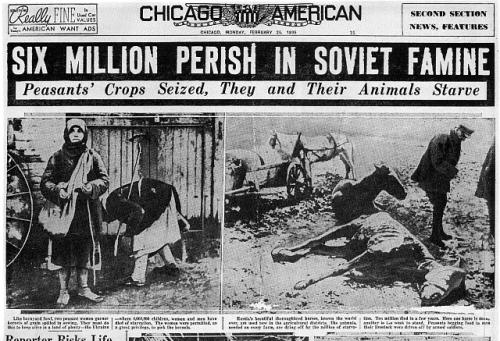
In 1932 and 1933 the Soviet government chose to seize the harvest of the peasants. Ukrainians and others, who refused to deliver grain or hided food, were sent to concentration camps, and many, including women and children, died of starvation. It is estimated that between two and four million Ukrainians lost their lives on that occasion. Photo Chicago America.
The Soviet factory managers were not motivated to optimize and improve their products according to consumers' needs and desires or to optimize their productivity, which in general was poor.
The socialist market planning in China was even worse. Mao had been on his only trip abroad, namely on a visit to the Soviet Union. He did not like that especially the Soviet steel production was China's steel production completely superior. He decided he would beat the Soviet Union in the production of steel by activating the "masses".
Mao ordered mini-blast furnaces to be built in all municipalities. The farmers should supply them with fuel and iron ore.
Production targets were high and punishments, if they were not met, were brutal. Houses were broken down to use the woodwork as fuel. Pots and pans were thrown in the ovens in order to achieve the required production of iron. There were about a million mini-steelworks, some writers say. The products were usually some useless brown nuggets filled with slags.
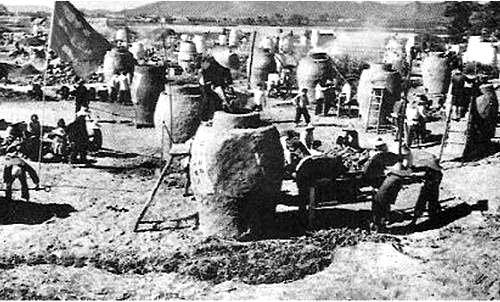
The Great Leap Forward in China. Mao ordered Chinese peasants to build mini blast furnaces. It is believed that there were about a million mini-blast furnaces in China in the period 1959-61.
As all men were busy producing "iron", they did not have time to take care of their work in the fields, and the whole Great Leap Forward ended up triggering a hunger catastrophe estimated to have cost about 40 million people's life.
In the ensuing Cultural Revolution, the "planning" fared even worse; virtually all production ceased for several years, and schools were closed because the teachers were afraid of accidentally saying something wrong.
The practical socialist planning never worried Karl Marx. He simply wrote in Capital that the goal of all communist planning is the satisfaction of "social needs".
Marx and his later disciples saw their own teaching to be the scientific socialism, which was based on real-world phenomena and events, as opposed to the utopian socialism, which they believed originated from dreams and good thoughts. In The Poverty of Philosophy Marx relentlessly attacks the Frenchman Proudhorn for promoting unrealistic utopian theories.
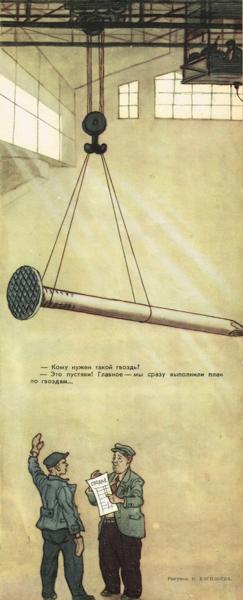
A famous Soviet satirical drawing. The manager of a nail-factory received the Lenin order for exceeding his production target, which was noted in tonnes, with several ton. A giant nail is seen lifted by a crane. Photo Skeptics Stack Exchange.
How Marx really envisioned the communist society, history's ultimate goal, remains in twilight and haze. He is responsible for that, as he never presented one comprehensive description of his thoughts about the final communist society. Descriptions of communist society are scattered throughout his writings.
However, dr. Phil Bertell Ollman from Wisconsin has sought to remedy this, having gathered many of Marx's statements and comments about the communist community in one article.
The description of Marx's future society, which, with scientific legitimacy, must emerge after some time of socialist transition, comes evidently from his imagination, dreams and wishes. It probably tells a lot about the person Karl Marx, but this we will let go. His description of the future community is not based on any clear or plausible definition of human nature; It is not based on any logical projection of the technological, societal and cultural trends of the present - it is basically a true utopia.
In the final communist Utopia, division of labor, wage slavery and alienation has completely disappeared, and thus unprecedented abilities and talents of the individuals have been freed. Therefore the new communist man will be so much more intelligent, versatile, selfless, social and altruistic than the original simple laborers, who toiled under the yoke of capitalism.
The communist society will be classless and stateless It is characterized by shared ownership of the means of production with free access to consumer goods. The classes have eliminated themselves, and the state has faded away because it is no longer needed.
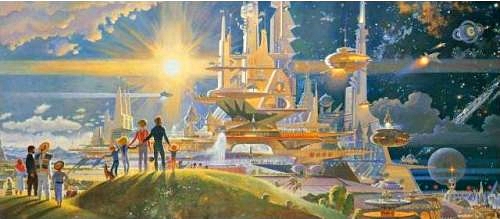
Utopia. Foto Steemit.
In Critique of the Gotha Programme we find the origins of the famous - and infamous - phrase about working after ability and enjoy as needed: "In a higher phase of communist society, after the enslaving subordination of the individual to the division of labor, and therewith also the antithesis between mental and physical labor, has vanished;" - "From each according to his ability, to each according to his needs!"
When we look around in today's society, we can get the idea, that with the extensive modern welfare system, communism has already been partially realized.
In communist society, private property will everywhere be replaced by social ownership. In The Communist Manifesto, the destruction of private property is mentioned in many places: "They (the proletariat) have nothing of their own to secure and to fortify; their mission is to destroy all previous securities for, and insurances of, individual property." - "The distinguishing feature of Communism is not the abolition of property generally, but the abolition of bourgeois property." - "In this sense, the theory of the Communists may be summed up in the single sentence: Abolition
of private property." - "The Communist revolution is the most radical rupture with traditional property relations;" and so on in many others of Marx's writings.
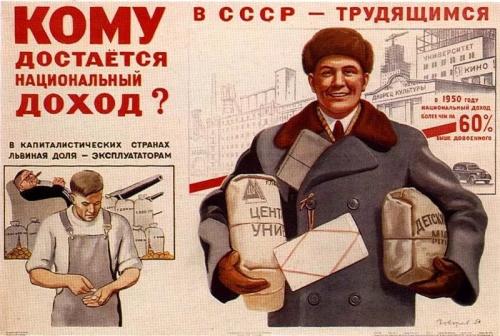
Marx predicts that at history's ultimate goal of full communism, the shops will be full of goods. Photo fishi.net.
Division of labor and specialization will disappear completely and with that the individual's inclination to devote their lives to a single profession. The new liberated communist human being with its newly released enormous potential will have need and ability to perform many kinds of work.
In Critique of the Gotha Programme, Marx states: "The contradiction between mental and physical work has disappeared."
Marx's best-known description of the absence of division of labor can be found in "The German Ideology": "While in communist society, where nobody has one exclusive sphere of activity, but each can become accomplished in any branch, he wishes, society (?) regulates the general production and thus makes it possible for me to do one thing today and another tomorrow, to hunt in the morning, fish in the afternoon, rear cattle in the evening, criticise after dinner, just as I have a mind, without ever becoming hunter, fisherman, herdsman or critic."
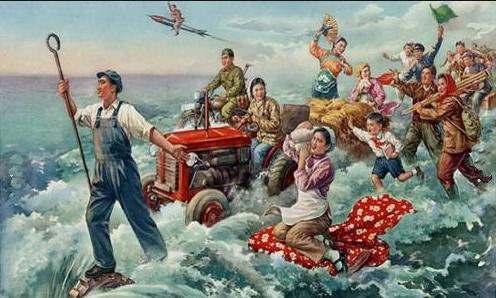
Chinese workers and peasants are jubilant on the way to communist paradise. Photo Alphaville.
In the future communist society, anyone who wants can become excellent art painters: he says in German ideology: "The exclusive concentration of artistic talent in some individuals and its suppression in the grand mass, which springs from this, is a consequence of the division of labor." - "In a communist society, there are no painters, but men who among other things do painting."
In Capital Marx approvingly quotes Hegel: "By well-educated men we understand in the first instance those, who can do everything others can do".
We can send a thought to our modern politicians passionate believing that they can solve all problems in relation to the modern high-tech community's needs with increased education, and the young people's innate intelligence level only plays a minor role.
Activities in common will be preferred. The new communist man will very much prefer doing things in common with others.
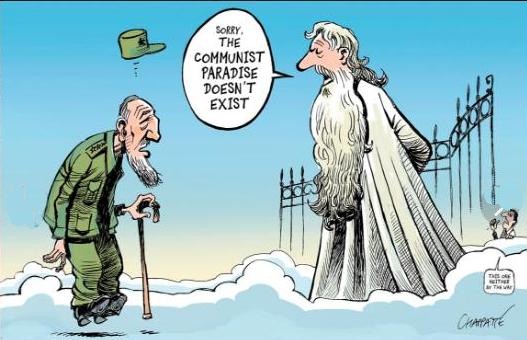
Fidel Castro is dead but is rejected at the gate of Christian Paradise: "The communist paradise does not exist." Photo Galleryhip.com.
In the "1844 Manuscripts", Marx states that another important characteristic of communist society is the high degree of cooperation and mutual commitment that the new communist man will prefer in most human activities. An indication of this development is simply the increase in the number of things that people do together.
In 1844 Manuscripts, he describes how he imagines social interaction under full communism: "What appears as a means becomes an end. You can observe this practical process in its most friendly results wherever you can see French socialist workers together. Such things as smoking, drinking, eating, etc., are no longer means of contact or means that bring together. Company, association, conversation, which again has society as its end, are enough for them." further "The feeling and enjoyment of other people has become my own motivation."
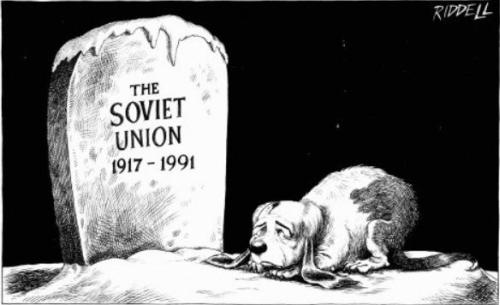
Gorbachev mourns the Soviet Union's demise - drawing by Huffaker.
It is indisputable that man is a social animal - such as apes, elephants, baboons and wolves - and all our ambitions, experiences and the very meaning of our lives are connected with interaction with others.
Complete control of nature Another unique feature of the communist society is the mastery of control that humans will exert over all forces and objects of nature. Everything, that the new man comes into contact with, becomes a product of his conscious effort to adapt things for his own purposes. In German Ideology it is said that the new man: "for the first time, consciously treats all natural premises as the creatures of men, strips them of their natural character and subjugates them to the power of individuals united"; which is said to refer to: "the casting off of all natural limitations." What is somewhat contrary to his idea that the development of the means of production (and not the human thought) determines the events.
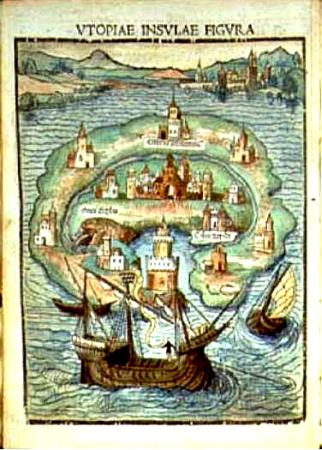
Utopia by Thomas Moore from 1516 is the archetype of an utopia. He depicts an imaginary island with a whole new state structure. The main features of the Utopian community are social equality and the absence of property rights.
"These are the real solutions to the conflict between man and nature," we read in the 1844 Manuscripts.
Already now, the world's progressive governments are convinced that humans can manipulate the climate of the planet; it has evolved into an entirely new religion.
There will be no enforced rules and coercion. Apart from the work in factories and in agriculture, no activities in which individuals participate will be organized in advance by others; that is, there is nothing they absolutely need to do, and no predetermined way or schedule they necessarily have to follow.
Marx describes that there will be a form of organization for the productive work in factories and agriculture; However, it will only lead the work in the same way that a conductor leads a willing orchestra. Restrictive rules will be unknown; and there will be no coercion or punishment.
In Capital, Marx tells that soldiers, police officers, executioners, legislators and judges will be unnecessary. "under appropriate conditions in society". He says somewhere that under communism, the colonial state and thereby democracy will wither away. All forms of parliamentarism will be "ranged under the category of nuisances.".
In the Holy Family (p 299), Marx is said to come up with the somewhat cryptic statement: "under human conditions" - which is assumed to be prevailing in full communism - "punishment will really be nothing but the sentence passed by the culprit on himself. There will be no attempt to persuade him that violence from without, exerted on him by others, is violence on himself by himself. On the contrary, he will see in other men his natural saviors from the sentence which he has pronounced on himself; in other words, the relation will be reversed." This must mean that a genuine legal and punitive authority will not exist under full communism; The criminals will have to judge and punish themselves.
We must believe that modern prisons are very close to the communist ideal. The prisoners have access to fitness center, weekend break and the possibility of family visits. The cells are with private bath, refrigerator and TV. Every day, delicious food is served. In the new prison in Greenland, the inmates also have a beautiful sea view and the opportunity to take care of their daily work in the nearby city.

Next year, 2019, the new prison, Ny Anstalt, in Nuuk in Greenland is expected to open. The building is a completely modern design and looks like a luxury hotel. It will contain 76 cells with each 12 M2, 40 closed cells and 36 open cells. There will be sea view and a stunning mountain view from the prison. There will be common areas with comfortable sofas and sports areas. Prisoners with special privileges will be allowed to go to Nuuk and work and come back in the evening to spend the night in the cell. Some information says that prisoners can be allowed to go hunting with rifles. The prison designer Thomas Ruus Christensen says that prison officers will not be armed, as it may create a bad atmosphere. Photo Facebook.
The communist world will be a globalized world he says in the Communist Manifesto. In the new communist world society, the states will fade away and thus the nations, and all humanity will be united as one big happy family populated by the new communist selfless individuals liberated from division of labor, wage slavery and alienation: "In place of the old local and national seclusion and self-sufficiency, we have intercourse in every direction, universal inter-dependence of nations. And as in material, so also in intellectual production. The intellectual creations of individual nations become common property. National one-sidedness and narrow-mindedness become more and more impossible, and from the numerous national and local literature, there arises a world literature.

Sport area in the recently opened Storestroem Prison. Photo Kamikposten.
In The German Ideology he is even more specific about the future global economy: "Only then will the separate individuals be liberated from the various national and local barriers, be brought into practical connection with the
material and intellectual production of the whole world and be put in a position to acquire the capacity to enjoy this all-sided production of the whole earth.
We can only note that the EU leaders work hard and energetically every single day to realize Karl Marx's visions and make the European nations disappear by daily importing thousands of Africans and Arabs into Europe.
The realization of Marx's ideas about globalization today has created an international elite, more rich and powerful than anything the world has ever seen - in complete contrast to the usual Marxist propaganda about equality.
Marx's ideas concerning full communism clearly show that communism is a spacious social-constructivist ideology that appeals to individual's dreams of the perfect society. It intends to break down everything old and - based on a vague dream of the perfekt society - build a new and supposed ethically superior society from scratch in an alleged rationel way - a society populated by the new communist human-type. Marxists do not recognize any innate human nature and from this deduced economic laws. They basically believe that the new society must be constructed fully rationally, and irrational historical cultures handed down from previous generations are therefore worthless.
Communism's goal is not to adjust society to a human nature, or to adapt man to the existing society. The goal is far more ambitious; with terror, brainwash and propaganda they will change both society and man following their obscure dreams of a future perfect and harmonious society. They do not accept a biologically conditioned human nature or society and nations as they emerge from history.
The Chinese Cultural Revolution was precisely about to destroy everything old and create the new, more perfect, communist human beings through terror and propaganda. It was not a regrettable wild-shot in the evolution of communism, but really a simple, educational illustration of Marxism's basic essence. It perfectly illustrates how Marx imagines that the masses will raze to the ground everything old, cut all connections to their history, struggle against the primitive historical man and create the new society and the new communist human-type, which is supposed to be ethically and intellectually superior everything that history has seen so far.
| To top |